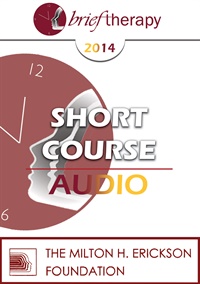
- Average Rating:
- Not yet rated
- Topic Areas:
- Anxiety | Depression | Trauma | Short Courses | Milton Erickson | Brief Therapy
- Categories:
- Brief Therapy Conference | Brief Therapy Conference 2014
- Faculty:
- Dale Bertram, PhD | Mike Rankin, MA
- Duration:
- 1:33:32
- Format:
- Audio Only
- Original Program Date:
- Dec 11, 2014
- Short Description:
- This workshop focuses on the nuts and bolts of providing online Ericksonian Clinical Supervision. It will address how to select an online platform, the major legal and ethical issues in providing online supervision, and a focused discussion on how to utilize the online environment to provide quality supervision. Participants will leave this workshop with a good overview about how to conduct digital (online) supervision in ethical and useful ways.
- Price:
- $15.00 - Base Price
Tags: Anxiety Depression Trauma Brief Therapy
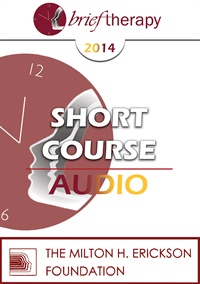
- Average Rating:
- Not yet rated
- Topic Areas:
- Anxiety | Depression | Trauma | Short Courses | Brief Therapy | Ericksonian Hypnosis and Therapy Techniques | Consciousness
- Categories:
- Brief Therapy Conference | Brief Therapy Conference 2014
- Faculty:
- Joseph Dowling, MS, LPC
- Duration:
- 1:27:36
- Format:
- Audio Only
- Original Program Date:
- Dec 11, 2014
- Short Description:
- Milton H. Erickson, M.D. understood that the conscious (thinking) mind is where symptoms are frequently created and cultivated while the subconscious mind is a limitless storehouse of healing energies, potentials, and solutions. This short course will describe a deceptively simple, Ericksonian approach to becoming powerfully calm. Live demonstrations, experiential zone exercises, and case studies will be facilitated to teach how solution-focused questions, strategic interventions, and formal/conversational hypnotherapy effectively treat anxiety, depression, and trauma.
- Price:
- $15.00 - Base Price
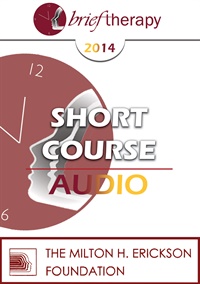
- Average Rating:
- Not yet rated
- Topic Areas:
- Anxiety | Depression | Trauma | Short Courses | Ericksonian Hypnosis and Therapy Techniques | Reality Therapy | Brief Therapy
- Categories:
- Brief Therapy Conference | Brief Therapy Conference 2014
- Faculty:
- Robert Wubbolding, EdD
- Duration:
- 1:29:28
- Format:
- Audio Only
- Original Program Date:
- Dec 11, 2014
- Short Description:
- A demonstration and a 12-minute DVD illustrate how to assist clients to make effective choices satisfying their needs, especially power or inner control. Merging reality therapy with Ericksonian principles helps clients discover and choose alternatives to the manifestations of past trauma, the pain of powerlessness due to anxiety and depression.
- Price:
- $15.00 - Base Price
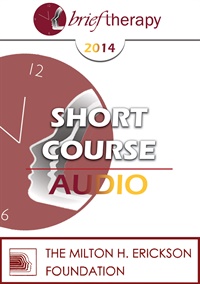
- Average Rating:
- Not yet rated
- Topic Areas:
- Anxiety | Depression | Trauma | Short Courses | Brief Therapy
- Categories:
- Brief Therapy Conference | Brief Therapy Conference 2014
- Faculty:
- Virgil Hayes, DO
- Duration:
- 1:33:07
- Format:
- Audio Only
- Original Program Date:
- Dec 11, 2014
- Short Description:
- There are multiple explanations and theories to explain the creation of anxiety, depression and trauma creation. Many emphasize pathology, permanence of conditions and use multi-syllable words and encourage medical interventions to treat symptoms. This paradigm is often not effective for improving the lives of individuals treated. This course looks at non-medical underpinnings to conceptualize the creation of anxiety, depression and trauma.
- Price:
- $15.00 - Base Price
Tags: Anxiety Depression Trauma Brief Therapy
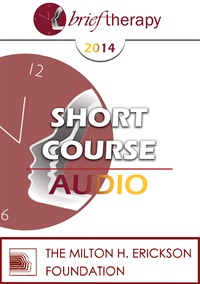
- Average Rating:
- Not yet rated
- Topic Areas:
- Anxiety | Depression | Short Courses | Communication | Neurobiology | Brief Therapy | Trauma
- Categories:
- Brief Therapy Conference | Brief Therapy Conference 2014
- Faculty:
- Bart Walsh, MSW
- Duration:
- 1:31:46
- Format:
- Audio Only
- Original Program Date:
- Dec 11, 2014
- Short Description:
- There are multiple explanations and theories to explain the creation of anxiety, depression and trauma creation. Many emphasize pathology, permanence of conditions and use multi-syllable words and encourage medical interventions to treat symptoms. This paradigm is often not effective for improving the lives of individuals treated. This course looks at non-medical underpinnings to conceptualize the creation of anxiety, depression and trauma. This conceptualization when understood by the clinician; makes them a better facilitator and co-creator in the treatment process. A natural, holistic understanding also empowers the clinician and client and moves all parties involved closer to health.
- Price:
- $15.00 - Base Price
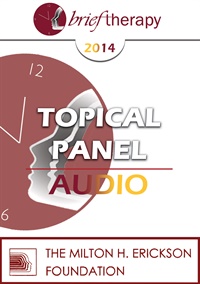
- Average Rating:
- Not yet rated
- Topic Areas:
- Anxiety | Topical Panels | Brief Therapy
- Categories:
- Brief Therapy Conference | Brief Therapy Conference 2014
- Faculty:
- Lynn Lyons, LICSW | Reid Wilson, PhD | Ronald Siegel, PsyD
- Duration:
- 1:01:07
- Format:
- Audio Only
- Original Program Date:
- Dec 13, 2014
- Short Description:
- BT14 Topical Panel 06 - Anxiety Disorders - Reid Wilson, PhD, Lynn Lyons, LICSW, and Ronald Siegel, PsyD Educational Objectives: Compare and contrast clinical philosophical perspectives of experts.
- Price:
- $15.00 - Base Price
Tags: Anxiety Brief Therapy
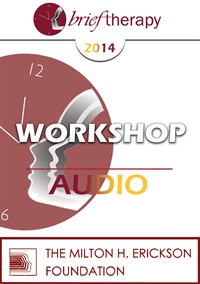
- Average Rating:
- Not yet rated
- Topic Areas:
- Anxiety | Workshops | Unconscious Processes | Brief Therapy
- Categories:
- Brief Therapy Conference | Brief Therapy Conference 2014
- Faculty:
- Steve Andreas, MA, NLP
- Duration:
- 1:05:06
- Format:
- Audio Only
- Original Program Date:
- Dec 12, 2014
- Short Description:
- Learn two very simple, rapid, and direct ways to elicit and transform the key unconscious processes that create anxiety. One utilizes changes in the sensory details of the feeling itself; the other changes the tempo of the internal worry voice that generates the feeling. Demonstrations, exercises and discussion.
- Price:
- $15.00 - Base Price
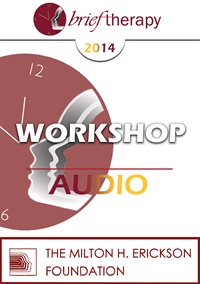
BT14 Workshop 03 - Anxious Kids, Anxious Parents: 7 Ways to Stop the Worry Cycle - Lynn Lyons, LICSW
- Average Rating:
- Not yet rated
- Topic Areas:
- Anxiety | Worry | Workshops | Brief Therapy | Children and Adolescent Therapy
- Categories:
- Brief Therapy Conference | Brief Therapy Conference 2014
- Faculty:
- Lynn Lyons, LICSW
- Duration:
- 1:50:51
- Format:
- Audio Only
- Original Program Date:
- Dec 12, 2014
- Short Description:
- Current research supports the inclusion of both parents and children in the treatment of anxiety in children based on the strong correlation between anxious parents and the subsequent development of anxiety in their children. This workshop will describe seven concrete strategies that teach families to interrupt the worry cycle and its all too common transmission from parent to child.
- Price:
- $15.00 - Base Price
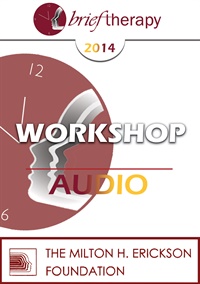
- Average Rating:
- Not yet rated
- Topic Areas:
- Anxiety | Depression | Workshops | Brief Therapy
- Categories:
- Brief Therapy Conference | Brief Therapy Conference 2014
- Faculty:
- Michael Yapko, PhD
- Duration:
- 1:58:22
- Format:
- Audio Only
- Original Program Date:
- Dec 12, 2014
- Short Description:
- Rumination involves spinning around the same thoughts over and over again, analyzing endlessly why something happened or what to do about some situation. Rumination increases anxiety and depression levels, and perpetuates itself by the client believing that by ruminating, he or she is “doing something.” In this workshop, we’ll explore rumination and its negative effects, highlight the relationship between rumination and global cognition, and emphasize the importance of developing good discrimination skills. We’ll also consider the role of experiential processes such as hypnosis and mindfulness in treatment didactically as well as with a guided group experience.
- Price:
- $15.00 - Base Price
Tags: Anxiety Brief Therapy Depression
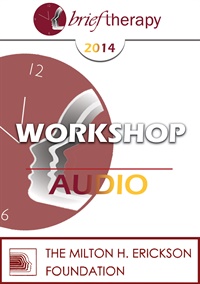
- Average Rating:
- Not yet rated
- Topic Areas:
- Anxiety | Depression | Trauma | Cognitive Behavior Therapy (CBT) | Hypnosis | Workshops | Ericksonian Hypnosis and Therapy Techniques | Milton Erickson | Brief Therapy | Naturalistic
- Categories:
- Brief Therapy Conference | Brief Therapy Conference 2014
- Faculty:
- Ernest Rossi, PhD | Kathryn Rossi, PhD | Roxanna Erickson Klein, RN, PhD, LPC, LCDC
- Duration:
- 1:59:16
- Format:
- Audio Only
- Original Program Date:
- Dec 12, 2014
- Short Description:
- Ernest Rossi, PhD, Roxanna Erickson-Klein and Kathryn Rossi review the case work of Milton H. Erickson, MD in counseling, psychotherapy, therapeutic hypnosis and rehabilitation as evidence-based cognitive behavior therapy to treat anxiety, depression and trauma. This experiential workshop explores the timeless nature of the work of Milton H. Erickson, who substantially influenced the manner that psychotherapy is practiced in the 21 century.
- Price:
- $15.00 - Base Price
Please wait ...

